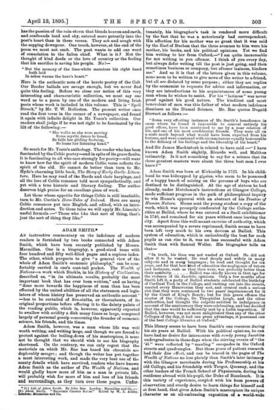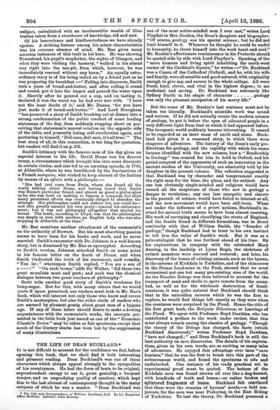ADAM SMITH.*
AN instructive commentary on the indolence of modern readers is furnished by two books connected with Adam Smith, which have been recently published by Messrs. Macmillan. One is a biography, a good-sized tome with four hundred and fifty well-filled pages and a copious index. The other, which purports to give " a general view of the whole of Adam Smith's economic philosophy," can be com- fortably carried in one's coat-tail pocket. The Wealth of Nations—a work which Buckle, in his History of Civilisation, described as, "in its ultimate results, probably the most important book that has ever been written," and as having " done more towards the happiness of man than has been effected by the united abilities of all the statesmen and legis- lators of whom history has preserved an authentic account " —has to be curtailed of five-sixths, or thereabouts, of its original proportions before offering it to the dainty palate of the reading public, which is, however, apparently expected to swallow with avidity a dish many times as large, composed largely of personal gossip concerning the founder of economic science, his friends, and his times.
Adam Smith, however, was a man whose life was well worth writing, and writing large, and though we are forced to protest against the boiling-down of his masterpiece, it must not be thought that we should wish to see his biography shortened. On the contrary, we can only regret that the materials on which Mr. Rae has based his chronicle are deplorably meagre ; and though the writer has put together a most interesting work, and made the very best use of the scanty details which have survived, readers who have known Adam Smith as the author of The Wealth of Nations, and would gladly know more of him as a man in private life, will probably wish for more of him and less of his friends and surroundings, as they turn over these pages. Unfor- • (1.) Life of Adam Smith. By John Rae. London : Macmillan and Co.-- 2) Adam Smith. " Recnomic Classics Scr:es." Edited by W. J. Ashley. landau: Macmillan and Co.
tunately, his biographer's task is rendered more difficult by the fact that he was a notoriously bad correspondent. His affection for his mother was so great that it was said by the Earl of Buchan that the three avenues to him were his mother, his books, and his political opinions. Yet we find him writing to her from Oxford,—" I am quite inexcusable for not writing to you oftener. I think of you every day, but always defer writing till the post is just going, and then sometimes business or company, but oftener laziness, hinders me." And so it is that of the letters given in this volume, none seem to be written to give news of the writer to a friend, but all are dictated by some purpose ; either they are replies by the economist to requests for advice and information, or they are introductions to his acquaintances of some young man whom he wishes to assist. For his " laziness " was never proof against his good nature. The kindliest and most benevolent of men was this father of what modern indolence dismisses as the Dismal Science. Mr. Rae quotes Dugald Stewart as follows :-
Some very affecting instances of Mr. Smith's beneficence in cases where he found it impossible to conceal entirely his good offices, have been mentioned to me by a near relation of his, and one of his most confidential friends. They were all on a scale much beyond what would have been expected from his fortune, and were combined with circumstances equally honourable to the delicacy of his feelings and the liberality of his heart."
And Sir James Mackintosh is related to have said :—" I have known Adam Smith slightly, Ricardo well, and Malthus intimately. Is it not something to say for a science that its three greatest masters were about the three best men I ever knew P" Adam Smith was born at Kirkcaldy in 1723. In his child- hood he was kidnapped by gipsies, who seem to be possessed of a happy knack of seizing on the persons of boys who are destined to be distinguished. At the age of sixteen he had already, under Hutcheson's instructions at Glasgow College, made sufficient progress in the path of philosophical inquiry
to win Hume's approval with an abstract of his Treatise of Human Nature. Hume sent the young student a copy of the work, which was promptly confiscated by the College autho- rities at Balliol, where he was entered as a Snell exhibitioner in 1740, and remained for six years without once leaving the city. Apart from this well-meant exercise of authority, which was accompanied by a severe reprimand, Smith seems to have been left very much to his own devices at BallioL This system of education, which is undoubtedly the best for such pupils as can rise to it, was no less successful with Adam Smith than with Samuel Weller. His biographer tells us that- " In truth, his time was not wasted at Oxford. He did not allow it to be wasted. He read deeply and widely in many subjects and in many languages ; he read and thought for six years, and for that best kind of education the negligence of tutors and lecturers, such as they then were, was probably better than their assiduity.. , . . . Balliol was chiefly known in that age for the violence of its Jacobite opinions. Only a few months after Smith left it, a party of Balliol students celebrated the birthday of Cardinal York in the College, and rushing out into the streets, mauled every Hanoverian they met, and created such a serious riot that they were sentenced to two years' imprisonment for it by the Court of King's Bench; but for this grave offence the master of the College, Dr. Theophilus Leigh, and the other authorities, had thought the culprits entitled to indulgence on account of the anniversary they were celebrating, and had decided that the case would be sufficiently met by a Latin imposition. If Balliol, however, was not more enlightened than any of the other Colleges of the day, it had one great advantage, it possessed one of the best College libraries at Oxford."
This library seems to have been Smith's one resource daring his six years at Balliol. With his political opinions, he can have had no desire for intercourse with rowdy young Jacobite undergraduates in those days when the stirring events of " the '45 " were reflected by " mauling " escapades in the Oxford streets and quadrangles. But these years of patient research had their dae effect, and can be traced in the pages of The Wealth of Nations no less plainly than Smith's later intimacy with the Glasgow merchants during his Professorship at his old College, and his friendship with Turgot, Quemoy, and the other leaders of the French School of Physiocrats, during his residence abroad with his pupil, the Duke of Buccleuch. It is this variety of experience, coupled with his keen powers of observation and sturdy desire to learn things for himself and at first hand, that gives Adam Smith's masterpiece its unique character as an all-embracing exposition of a world-wide
subject, embellished with an inexhaustible wealth of illus- tration taken from a storehouse of knowledge, old and new.
Of his benevolence and kindheartedness we have already spoken. A striking feature among his minor characteristics was his extreme absence of mind. Mr. Rae gives many amusing instances of this trait in his hero. He was showing Townehend, his pupil's stepfather, the sights of Glasgow, and when they were visiting the tannery, " walked in his absent way right into the tan-pit, from which, however, he was immediately rescued without any harm." An equally extra- ordinary story is of bis being called on by a friend just as he was preparing his breakfast :—" Falling into discourse, Smith took a piece of bread-and-butter, and after rolling it round and round, put it into the teapot and poured the water upon it. Shortly after he poured out a cup, and on tasting it, declared it was the worst tea he had ever met with. have not the least doubt of it,' said Mr. Dames, for you have just made it of bread-and-butter." And Lord Brougham "has preserved a story of Smith breaking out at dinner into a strong condemnation of the public conduct of some leading statesman of the day, then suddenly stopping short on per- ceiving that statesman's nearest relation on the opposite side of the table, and presently losing self-recollection again, and muttering to himself, Deil care, deil care, it's all true." The best story of all, in this connection, is too long for quotation, but readers will find it on p. 331.
Smith's intimacy with the famous men of his day gives an especial interest to his life. David Hume was his dearest crony, a circumstance which brought him into some disrepute
in certain circles, and also led to an amusing episode, in 1766, at Abbeville, where he was bewildered by the fascinations of a French marquise, who wished to keep abreast of the fashion by means of an affairs with a philosophe "She had just come from Paris, where she found all the world talking about Hume, and having heard that Smith was Hume's particular friend, and almost as great a philosopher as he, she was bent on making so famous a conquest, but after many persistent efforts was eventually obliged to abandon the attempt. Her philosopher could not endure her, nor could he— and this greatly amused his own party—conceal his embarrass- ment; but it was not philosophy altogether that steeled his breast. The truth, according to Lloyd, was that the philosopher was deeply in love with another, an English lady, who was also stopping in Abbeville at the time."
Mr. Rae mentions another attachment of the economist's on the authority of Stewart. But his most absorbing passion seems to have been for his books and work, and he never married. Smith's encounter with Dr. Johnson is a well-known story, but is dismissed by Mr. Rae as apocryphal. According to Scott's version, Johnson attacked Smith on some point in his famous letter on the death of Hume, and when Smith vindicated the truth of his statement, said roundly, " You lie ; " whereupon Smith replied, " You are a son of a — !" " On such terms," adds Sir Walter, " did these two great moralists meet and part ; and such was the classical dialogue between two great teachers of philosophy."
Scott tells another good story of Smith's weakness for lump-sugar. But for this, with many others that we would quote if space permitted, our readers must look to Mr. Rae's book, which will interest not only those who know and revere Smith's masterpiece, but also the wider circle of readers who are amused by pleasant gossip about great men of a bygone age. If any of these latter should desire to make a bowing acquaintance with the economist's works, the excerpts pre- sented in the little book just issued as one of the " Economic Classic's Series " may be taken as fair specimens, except that much of the literary charm has been lost by the suppression of many illustrations.



































 Previous page
Previous page